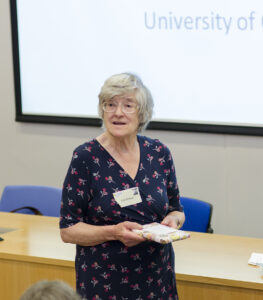
“When anyone first met Pat Pinsent, you never forgot her. She may have looked like a stereotypical older woman but if that was all you thought, you were sorely mistaken. She had a startlingly brilliant intellect but she never flaunted it.
Dr. Pinsent was one of a very rare type of person who held degrees in both English literature and Maths. In one of my first conversations with her as one of her Master’s students in Children’s Literature, she valiantly tried to explain the difference between the average and the median to me. There was a reason I took English.
Pat could always be relied upon to support anyone she believed in long after they stopped being her student. She would always fight your corner and take a stand against bureaucracy.
One of my favourite memories was when she had quoted my doctoral research in her final book published in 2016. We met shortly afterwards and she said to me “Did you look yourself up in the index?” Blushing, I admitted this was true. We both laughed. She said “we’ve all done that!”
Dr. Pinsent served for many years as an editor of IBBYLINK, the journal of IBBY UK. She encouraged all her students to write reviews for the journal and to take a role in IBBY UK as she did. I have never regretted my decision, after a conversation with her, to join the UK Committee.
Thank you, Pat for everything and for all the times you stood by me.”
Dr. Rebecca Butler
Former colleague at Roehampton University, Dr. Gillian Lathey, also shared a few words for Pat:
Pat Pinsent’s integrity, kindness, sharp intelligence and mischievous wit will be remembered fondly by all who knew her, as indeed will the eccentricities that stood out in an increasingly conformist world.
Pat’s interests were broad. From the vantage point of a Catholic feminist she engaged in the study of mathematics (her first degree), children’s reading development, English literature (the poet George Herbert was a particular favourite), children’s literature and Catholic liturgy in the single-minded pursuit of knowledge, and with an unflagging faith in the human spirit. During her long career at Roehampton Pat taught across the Education and English literature departments, running a centre on children’s reading in the former and acting as a mainstay of the Children’s Literature MA in the latter. Pat’s lengthy list of publications reveals the trajectory of her research: in the early 1990s she edited three of her best-known books, Children with Literacy Difficulties (Routledge), The Power of the Page: Children’s Books and their Readers (David Fulton), and the pioneering Language, Culture and Young Children: Developing English in the Multi-Ethnic Nursery and Infant School (Routledge). Later, Pat was at the helm of IBBY UK when it came to editing the journal IBBYlink or collections of papers from IBBY/NCRCL conferences, and published work on many aspects of children’s literature, from representations of gender race and disability in children’s books (Children’s Literature and the Politics of Equality Routledge) to varieties of British Protestant children’s fiction (in de Meyer et al eds. Religion, Children’s Literature and Modernity in Western Europe 1750-2000, Leuven University Press).
At Roehampton Pat worked indefatigably to assist students on the Children’s Literature MA to fulfil their potential. She undertook the cumbersome task of keeping her own records of marks and module credits, just in case ‘they’ (Pat’s preferred term for institutional bureaucrats) made mistakes to a student’s disadvantage. To all students Pat was an immensely supportive tutor, frequently going above and beyond the call of duty to advise and guide; and to colleagues and aspiring academics she met at conferences around the world Pat acted as mentor and editor, offering advice on academic papers or entire book manuscripts. Nor did such guidance cease with retirement: far from it. Visits to Pat were always busy with insights into papers published or books and journals recently edited, all of which facilitated the publication of the work of others.
It is not just Pat’s work that will live on. So, too, will her unforgettable personality. One memory of a journey to a conference in Naples with Pat highlights her forthright response to any form of authority. Pat was due a hip replacement and walking with the aid of a stick, but the first hitch occurred when a security official found traces of nitroglycerin in her luggage. After berating the airport security official for calling her ‘Madam’, and repeatedly asking whether she looked like a terrorist, Pat listened indignantly to all questions as to whether she had been in contact with lawn fertilizer, golf balls or heart medication (‘Do you have a heart condition Madam?’ ‘No, but I shall have now’) – all of which apparently can contain the substance. Eventually, after completing various forms in a back office, we were allowed to proceed. Other moments in Naples: Pat banging furiously with her stick on the ancient door of our hotel which was locked after dark; Pat NOT accepting any assistance from Italian sailors as weembarked for a day trip to Ischia; and Pat requesting, in Italian,cups of hot water for the dried-out tea bags she always carried in her handbag – why use them only once? Yet when it came to the conference she did, of course, deliver a thoroughly researched paper in the awesome surroundings of the Naples Philosophical Society.
Pat was both devoted to and supportive of her children and grandchildren; family holidays were a highlight of the year. And when, sadly, her husband Henry succumbed to dementia, she readhim children’s stories he remembered from childhood. Typically, Pat did not let this successful strategy rest there, but suggested it to others in an article for a journal on dementia and, moreover, wrote and self-published a children’s book detailing the dementia of a beloved grandparent from a child’s point of view (Life with Grandpa. AuthorHouse UK).
Throughout life and its trials, Pat was sustained by her faith. Shehad an extensive knowledge of the history of Catholicism: there was no obscure saint whose story was unknown to Pat. She was a co-founder of the Catholic Women’s Network, co-edited a book on creating Catholic liturgies (Making Liturgy, Canterbury Press), compiled an anthology of writings on women’s lives (Living, Loving, Longing, Canterbury Press Books), and lived in the hope of seeing the ordination of women in the Catholic Church and the election of a female pope.
I’ll close with a vision of Pat being winched by helicopter from Hadrian’s Wall thanks to an ankle injury, and holding court in the Senior Common Room with her leg on a chair thereafter. There truly won’t ever be another Pat, and we shall all miss her greatly.
